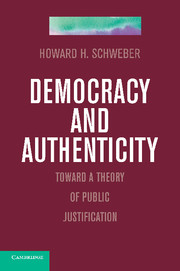Book contents
- Frontmatter
- Contents
- 1 Introduction
- Part One The Case for Constraint
- Part Two Responding to the Case for Inclusion
- 7 Arguments from Consequences
- 8 Further Arguments from Consequences
- 9 Fairness as Equality
- 10 Fairness as Recognition
- 11 The Argument from Epistemology
- 12 Empiricism and Public Justification
- 13 Toward a Theory of Public Justification
- Bibliography
- Index
- References
8 - Further Arguments from Consequences
Agonistic Democracy and Republican Virtue
from Part Two - Responding to the Case for Inclusion
Published online by Cambridge University Press: 05 November 2011
- Frontmatter
- Contents
- 1 Introduction
- Part One The Case for Constraint
- Part Two Responding to the Case for Inclusion
- 7 Arguments from Consequences
- 8 Further Arguments from Consequences
- 9 Fairness as Equality
- 10 Fairness as Recognition
- 11 The Argument from Epistemology
- 12 Empiricism and Public Justification
- 13 Toward a Theory of Public Justification
- Bibliography
- Index
- References
Summary
In the previous chapter, I articulated some responses to critiques of public reason offered from pluralistic, republican, and agonistic perspectives. I have argued that these challenges are frequently grounded on premises that are overly optimistic or unduly pessimistic, that historical references and analogies do not serve the consequentialist arguments in support of which they are deployed, and that in some cases insufficient attention has been paid to the element of coercion that is at stake in justifications for state action. These responses, however, did not remotely exhaust the strengths of those critiques. Moreover, in the process of engaging pluralist, multiculturalist, and deliberative theories (in Part One), it has become clear that a theory of public reason cannot exist in isolation. Rather, it must be situated within a larger theoretical approach to democratic politics writ large. That was the reasoning that connected the formulation of standards for public justification with the call for an abandonment of the politics of authenticity.
At the risk of tiresome repetition, it remains the case that the theory of public justification is not a complete political theory. A theory about the constraints of public justification, for example, does not seek to explain the conditions of possibility for unified popular action sufficient to resist the institutional imperatives of global capitalism or the interests of multinational corporations. On the other hand, a defensible theory of public reason must do more than simply explain why it is not fatal to such efforts, it must establish a connection between its constraints and the effectuation of unity across diversity. Similarly, it is not enough to simply insist that concerns for the consequences of irreconcilable conflict motivate the case for constraint; it is necessary to explain why constraints are a better response to those concerns than the embrace of multipolarity. And thus far, the challenge of McConnell's pluralism has been only partially addressed. Since the premise behind the case for constraints is, precisely, the inescapability of deep pluralism in a diverse democratic society, the justification for a particular version of the constraints of public reason has to be connected to a positive argument to the effect that constraints do a better job of making space for diversity in democratic politics than the alternatives.
Information
- Type
- Chapter
- Information
- Democracy and AuthenticityToward a Theory of Public Justification, pp. 241 - 267Publisher: Cambridge University PressPrint publication year: 2011
